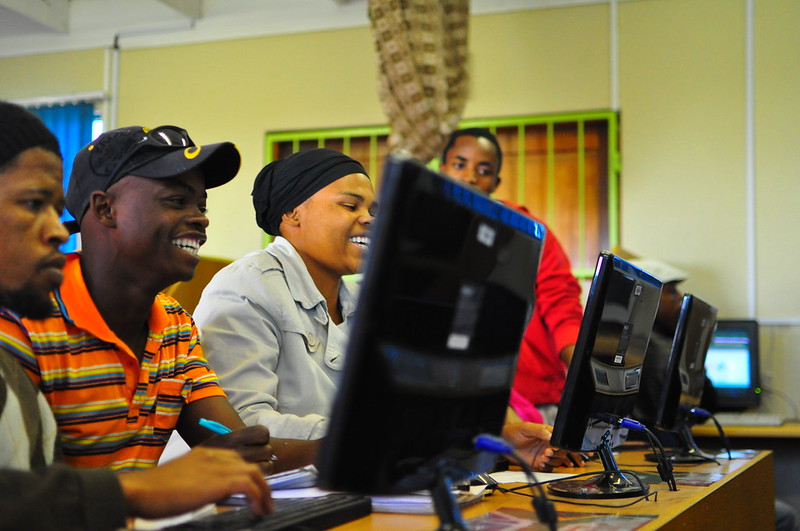
How AI in South Africa Fights Poverty
 South Africa faces significant socioeconomic challenges that hinder economic growth, increase unemployment and drive poverty levels higher. As of 2025, the World Bank projects that 63.5% of the population will continue to live below the upper-middle-income line of $6.85 per day.
South Africa faces significant socioeconomic challenges that hinder economic growth, increase unemployment and drive poverty levels higher. As of 2025, the World Bank projects that 63.5% of the population will continue to live below the upper-middle-income line of $6.85 per day.
Despite challenges, South Africa leads Africa in harnessing artificial intelligence (AI) to revive struggling industries, boost productivity and drive economic development. Indeed, the 2024 Global Index on Responsible AI ranks it as the continent’s top performer. The implementation of AI in South Africa plays a key role as the country fights poverty, by addressing structural inequalities and innovating health care, agriculture and the workforce.
AI in South Africa Fights Poverty
In 2019, South African President Cyril Ramaphosa announced the establishment of a commission to help the country benefit from the Fourth Industrial Revolution (4IR). The 4IR represents the ongoing technological transformation in society, driven by advances in modern technologies and artificial intelligence. Indeed, the commission’s efforts have opened new opportunities for South African society to integrate more effectively into a technology-driven workforce.
The creation of the AI Institute of South Africa further expands career and educational pathways for both students and professionals. Former IT students founded the institution to equip citizens with the skills needed for a digital workforce. It offers internships, job placements and professional development opportunities in the IT and engineering sectors, helping individuals thrive in a technology-driven economy.
Universities and research institutions also play an important role in building digital and technical skills, offering postgraduate programs focused on AI and data analytics. The University of Pretoria’s Data Science for Social Impact group offers courses in big data and natural language processing, while TVET colleges and Sector Education and Training Authorities deliver programs focused on 4IR.
These measures aim to directly reduce unemployment in South Africa. They support economic development by enhancing digital skills within the workforce.
AI in Agriculture
South Africa’s agricultural sector faces serious challenges from unpredictable and frequent natural disasters, which reduce crop yields and cause livestock losses. Rising food prices hit rural communities hardest, increasing the risk of food insecurity. Statistics South Africa revealed that by 2023, 19.7% of households had experienced some form of food insecurity.
Using AI in South Africa through digital agricultural technologies offers a chance to increase productivity and improve resource efficiency. For example, tools like Aerobotics use drone and satellite technology to detect pest and disease outbreaks, providing valuable support to rural communities with limited data access. Insights on irrigation and fertilisation strategies, predicted yields and water usage help farmers allocate resources more effectively, according to the 2024 GSMA report.
Alongside these technologies, locally led initiatives such as the ITIKI project demonstrate how AI can also strengthen food security by addressing climate-related risks. Led by the Central University of Technology, the project uses AI and indigenous knowledge to forecast droughts and track food security, GSMA reports. Delivering real-time insights to farmers and decision-makers aids in reducing crop loss. Additionally, farmers are guided to interventions and insights combat food insecurity in rural communities.
By strengthening agricultural resilience and efficiency, AI in South Africa plays a vital role in reducing food insecurity and alleviating poverty in vulnerable communities.
AI in Health Care
South Africa has seen significant advances in equal access to healthcare. As of 2025, the World Health Organization (WHO) projects that essential health care services will cover 6.2 million additional people.
The implementation of AI in South Africa further drives innovation in the health care sector by improving diagnostic accuracy, easing workloads and expanding access to services in rural areas. With 62% of health care leaders adopting AI for decision-making and treatment monitoring, South Africa is outpacing the global average in key areas of health tech adoption.
Data-driven decision-making and personalised healthcare initiatives significantly ease pressure on the public health sector. The government-led MomConnect initiative uses AI-powered messaging and virtual symptom assessments to support pregnant mothers. Timely health advice has improving maternal and child health outcomes, GSMA reports.
By expanding access to quality care, AI in healthcare plays a key role in reducing health-related poverty and bridging gaps in vulnerable communities.
The Future of AI in South Africa
Continued implementation of advanced technology in South Africa supports strong economic growth. Furthermore, AI-driven solutions directly address long-standing social challenges effectively by improving the quality of life in vulnerable areas.
South Africa’s National Artificial Intelligence Policy Framework aims to harness the long-term societal and economic benefits of advanced technologies. It sets clear guidelines for integrating AI in alignment with the country’s existing socio-economic goals. By doing so, the framework helps maximize AI’s potential while minimizing associated risks.
To fully realise the benefits of AI in South Africa, active collaboration between policymakers, government and citizens should drive inclusive policies, ensure equitable access to technology and prioritise solutions that address poverty and inequality. Indeed, with a shared commitment to innovation and ethical development, South Africa is well-positioned to shape a future where AI empowers its people and strengthens its society.
– Beatrice Punt
Beatrice is based in Manchester, UK and focuses on Technology and Solutions for The Borgen Project.
Photo: Flickr

